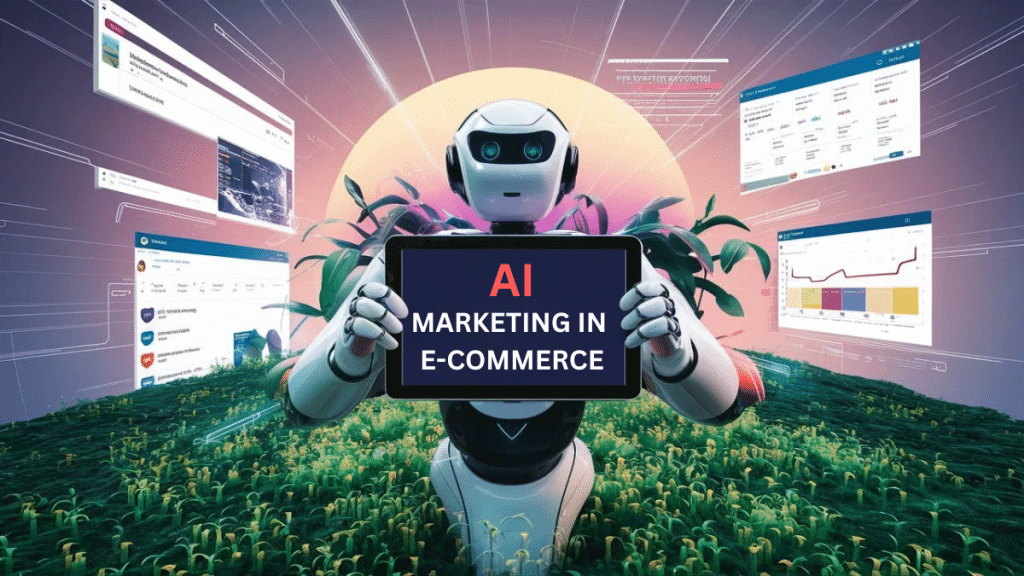The e-commerce sector is experiencing a massive transformation, and at the center of this change lies a powerful force: AI marketing tools.
These tools are no longer just optional add-ons—they’ve become essential for online retailers aiming to scale, personalize, and outperform in a hyper-competitive space.
From Manual to Smart: A Shift in E-Commerce Marketing
Gone are the days when marketing teams manually sorted through data, scheduled campaigns by gut feeling, or sent the same message to an entire customer list. AI marketing tools are now doing the heavy lifting—analyzing vast amounts of data, learning from customer behavior, and enabling marketers to make real-time, data-backed decisions.
These tools help businesses move from reactive to proactive marketing. Instead of waiting for customers to churn, AI can now predict when they might, enabling timely retention strategies. Rather than serving generic promotions, AI helps deliver hyper-personalized offers that convert.
Personalization at Scale
One of the most powerful contributions of AI marketing tools to e-commerce is the ability to personalize customer experiences at scale. AI can analyze browsing patterns, past purchases, time spent on product pages, and even mouse movement to predict what a shopper is most likely to buy.
For instance, recommendation engines—powered by machine learning—suggest products tailored to individual users. This not only improves user satisfaction but also significantly boosts average order value and customer loyalty.
Retail giants like Amazon have long been using this kind of AI-driven personalization, but thanks to accessible AI marketing tools, even small to mid-sized e-commerce brands can now compete with that level of sophistication.
Smarter Customer Segmentation
Effective segmentation is crucial for any marketing campaign. With traditional tools, segmentation might rely on basic demographics. AI marketing tools, however, go several layers deeper.
AI can segment audiences based on behavior, intent, and even predicted lifetime value. This advanced segmentation enables marketers to craft highly targeted campaigns—such as sending exclusive offers to high-value customers or retargeting users who abandoned their carts with timely discounts.
Moreover, AI doesn’t just segment once—it continuously updates segments in real time as customer data evolves, ensuring marketing efforts remain relevant.
Predictive Analytics: Marketing’s Crystal Ball
Imagine being able to anticipate what your customer wants before they even realize it. That’s the power of predictive analytics—a core feature of many AI marketing tools.
By analyzing historical data and identifying patterns, these tools can predict future outcomes such as:
- When a customer is most likely to buy
- Which products will trend next month
- What kind of content will drive the most engagement
E-commerce brands can use these insights to plan inventory, launch more timely campaigns, and improve ROI across all marketing channels.
Automating Repetitive Tasks
Another key benefit of AI marketing tools is their ability to automate time-consuming marketing tasks. Whether it’s writing email subject lines, scheduling social posts, or analyzing campaign performance, AI frees up human marketers to focus on strategy and creativity.
Tools like ChatGPT and Jasper can generate ad copy and product descriptions, while platforms like Mailchimp and ActiveCampaign use AI to send emails at the optimal time for each recipient. For e-commerce teams juggling multiple tasks, these automations are a game-changer.
Real-Time Customer Support with AI Chatbots
Customer service is a critical piece of the e-commerce puzzle, and delays or poor interactions can quickly turn a potential buyer away. AI-powered chatbots solve this problem by offering real-time, 24/7 support.
Modern AI chatbots can handle product inquiries, process orders, manage returns, and even upsell—often with human-like fluency. For customers, it feels like a seamless extension of the brand; for businesses, it means fewer support tickets and better resource allocation.
Data-Driven Ad Optimization
Paid advertising is a major investment for e-commerce brands, but without proper optimization, ad spend can quickly go to waste. AI marketing tools help analyze campaign performance across channels (Google, Facebook, Instagram, etc.), identify which creatives are driving the most conversions, and automatically reallocate budgets to the highest-performing assets.
AI can even generate multiple ad variations based on what’s resonating with your target audience, continuously testing and learning to refine your messaging. This level of precision significantly boosts ROI while reducing cost per acquisition.
Enhanced Customer Retention Strategies
Winning a new customer is great, but retaining them is better. AI marketing tools are instrumental in nurturing customer relationships and increasing lifetime value.
AI can automatically trigger personalized re-engagement campaigns for lapsed users, loyalty offers for repeat buyers, and feedback requests at the right moments in the buyer journey. It also helps marketers identify potential churn risks and intervene early with proactive outreach.
These small but timely interventions add up to stronger customer retention—and, ultimately, more sustainable growth.
Future-Proofing E-Commerce with AI
As e-commerce continues to expand, so too will the complexity of managing customer expectations and staying ahead of competitors. AI marketing tools offer a strategic advantage by turning vast amounts of customer data into actionable insights, personalized experiences, and automated campaigns that drive results. AI in marketing is widely recognized as a game-changer for brands navigating the digital landscape.
Whether you’re a startup or an established brand, integrating these tools into your marketing tech stack isn’t just smart—it’s necessary for survival in a data-driven world.
Final Thoughts
The integration of AI marketing tools is no longer a luxury—it’s a necessity for e-commerce businesses aiming to thrive in 2025 and beyond.
From personalized product recommendations and automated workflows to predictive analytics and real-time support, these tools are reshaping what’s possible in digital commerce.
By embracing AI now, e-commerce brands can future-proof their growth, deliver exceptional customer experiences, and stay ahead in an increasingly competitive market.
